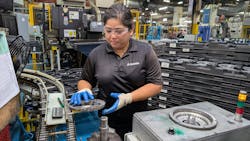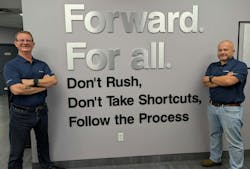2025 IndustryWeek Best Plants: MSM, Magna Powertrain Takes a Quality Approach to Operational Excellence
Key Highlights
- MSM emphasizes a culture of always seeking better ways, with 100% employee participation in self-directed teams and a focus on continuous improvement.
- Leadership development includes mentorship, stretch assignments, and training in soft skills to prepare a pipeline of capable leaders.
- The company employs a built-in-quality mindset.
- MSM's team-based approach and strategic problem-solving enabled them to meet a challenging 20% cost-saving goal, winning multiple awards.
What does operational excellence really mean?
Is it meeting an OEM’s challenge to develop a 20% cost-saving solution and then deliver a flawless launch with no quality issues?
Is it a keen pursuit of tool-life initiatives that dramatically reduce tool changes and associated downtime, maximizing machine operations without compromising quality?
Is it achieving 100% on-time delivery to your customers, not based on promise date but based on the tougher customer request date?
At MSM, Magna Powertrain Inc. in Woodbridge, Ontario, Canada, operational excellence encompasses all of these and more, making this workforce of 361 team members an easy selection as a 2025 IndustryWeek Best Plants Award winner.
Philosophy: Always Improving
As its name suggests, MSM is part of the powertrain division of automotive supplier behemoth Magna International. The IW Best Plants winner comprises two facilities located minutes from one another in Woodbridge (part of the greater Toronto area), and manufactures several transmission product families, including sprockets, housings and hubs. Flow forming, stamping and laser welding are among the processes employed by the manufacturer.
How operational excellence happens here isn’t a mystery. It’s about building a workforce that is always looking for a better way to get things done, bolstered by a team-based culture committed to making its people successful. One hundred percent of the production workforce participates in empowered or self-directed work teams.
“We live and breathe our culture together,” says general manager Barry Staddon.
The people-centered approach promotes:
- People are going to make mistakes. Mistakes lead to learning.
- Think big. Ask for a 50% improvement, not a 2% improvement. “I don’t expect to get it, but I’ll get better than limited goals,” Staddon says.
- Do the simple things “really well. It doesn’t often get the recognition it deserves,” the GM says.
- Embrace an entrepreneurial mindset. That’s what pushes the search for a better way.
MSM, Magna Powertrain Inc.
- Woodbridge, Ontario, Canada
- Employees: 361
- Total Square Footage: 170,000
- Primary Product: transmission components
- Start-up Date: 1969
- Achievements: ISO 14001 certified; ISO 45001 certified; Magna Manufacturing Excellence for Quality Award, 2018, 2020, 2021,2022, 2023, 2024; Toyota Excellence Quality Performance Award, 2019-2024
MSM’s performance metrics tell the tale of the organization’s success. Its quality metrics are outstanding and include 99.8% first-pass quality yield (with many quality awards to show for it). Low employee turnover and strong safety measures add to their achievements. Moreover, that excellence extends to the supply chain, with MSM’s suppliers providing near-perfect on-time delivery.
Robust Leadership Development Training
So, how specifically did MSM get to where it is today? People and process.
On the human side, “We believe in people, and we’re rarely wrong,” Staddon says.
Over the years, MSM has deliberately built an infrastructure to support people excellence, amending it along the way as opportunities to improve arise.
For example, when the team became unhappy with the results of their recruiting strategy, they revisited it and developed a 13-week onboarding plan that included multiple mentors for new hires. More recently, MSM introduced a career aspirations form that provides yet another option to existing avenues to pursue growth and development.
Then there’s the leadership training program, which feeds into MSM’s succession planning process.
“We want to have a pipeline,” explains human resources manager Grace Sousa. “We want people who are ready to go, people who are intermediate and people who are early in their journey.”
Some elements of MSM’s leadership development program may sound familiar. They include stretch assignments and mentorships, but MSM also homes in on sharpening skills specific to leadership. For example, while Sousa says people who are promoted into leadership roles typically are very strong technically, she adds, “Now we need to make sure that they’re strong in the soft skills, like the leadership, like developing people—it's a whole different ball game.”
Perhaps less familiar to a typical leadership development program is the question incoming participants are asked to consider: How can you do your job in one hour?
It’s not a question posed to encourage leaders to do less work. Instead, it’s meant to encourage thoughtfulness around working smarter and “instilling trust in others and your team around you— empowering them to do things and get stuff done—that it's not always the manager doing everything,” Sousa says. “They’re inspiring and leading and developing others to do things so that they are freed up for more meaningful work.”
There is always risk involved in moving individuals to new positions, even if they have applied for the position, but “we are committed to making people successful,” Staddon says.
Tools of the Continuous Improvement Trade
Part of that commitment to success means having the right tools for the job. A robust continuous improvement program, underpinned by the Magna Factory Concept (MAFACT), Magna’s global set of continuous improvement guidelines, propels MSM’s endless search for a better way. MSM’s continuous improvement tools include:
Near-monthly kaizen events.
Gemba discovery walks. Composed of cross-functional teams, these walks review improvement projects on the shop floor and look for additional opportunities for improvement.
Lessons learned. A centralized database allows users to apply past learnings to similar processes and new equipment.
Core Values League. These monthly sessions bring together the general manager, assistant general manager, and cross-functional teams of operators and technical support. Considered an “ideas channel to improvement,” the meetings provide opportunities for shop floor employees to discuss concerns, ideas, what’s working and what’s not.
“What’s good about this is the employees get time away, off the shop floor, to speak with senior management, that face-to-face interaction,” says Sousa. She adds, “The follow-up piece is key to make it successful. You can have the meetings, you can take notes, but if you do nothing with it, you lose credibility. And that's one thing our senior management team does, is they make sure they follow up.”
As the name implies, the meetings also offer a way to keep Magna’s core values top of mind, “so that we’re talking about them all the time,” Sousa adds.
Building in Quality
Quality is something else MSM talks about all the time. The automotive supplier’s mindset is one of “eliminating risk, not mitigating risk,” explains the MSM general manager. To that end, the company ferociously pursues the concept of built-in quality, developing processes that incorporate quality into every step of production rather than relying on inspection to catch the defects. It’s a proactive rather than reactive approach to quality.
On the plant floor, that translates to lots of automation and process controls, where possible, and the liberal use of error-proofing tools. One example is the addition of condition-based monitoring on the CNC machines. The system stops the CNC machine if it detects a cutting-tool chip or breakage, preventing the production of defective parts by the bad tool.
“We build to not allow you to make a bad part,” says Rajesh Sharma, quality and operating systems manager.
A separate but related initiative supports MSM’s quality drumbeat as well. It’s called the “infinite tool,” and it emerged from a “Darwin” project, so named to reflect that improvement never ends but evolves. The initiative’s goal was ambitious: Extend tool life indefinitely without hurting quality, thereby reducing downtime and improving productivity.
The teams behind the initiative achieved amazing gains. For example, a grinding tool change expanded from one per month to one every nine months. A tool change on a bushing machining operation stretched from once every two days to twice a year.
Keys to success included supplier collaboration, condition-based monitoring and intense data analysis. MSM’s “think big” philosophy didn’t hurt either.
Operational Excellence in Action
Another nod to MSM’s “think big” philosophy—and testament to the power of the organization’s team-based culture as a winning formula—was its success several years ago in meeting a Toyota Motor Corp. challenge to develop a 20% cost-savings solution for a transmission component used on several mainstream vehicles. Cost-savings requests typically are more modest, MSM notes.
“Although initially the target looked daunting, our team came together and started to work on potential ideas,” noted MSM in its IW Best Plants application.
Ultimately, MSM developed a solution that both reduced the amount of steel needed and the time needed to produce a part. Moreover, the solution was more environmentally friendly and improved the surface finish of the part, leading to improved quality and performance.
Not only did MSM meet the 20% cost-savings target, but the company won several Toyota awards for value add, quality and launch excellence.
Such success isn’t an isolated event at MSM. Nor is it unexpected. It’s the power of teams.
“Individually we may lack something. Teamwise we are powerful,” Staddon says.
About the Author
Jill Jusko
Bio: Jill Jusko is executive editor for IndustryWeek. She has been writing about manufacturing operations leadership for more than 20 years. Her coverage spotlights companies that are in pursuit of world-class results in quality, productivity, cost and other benchmarks by implementing the latest continuous improvement and lean/Six-Sigma strategies. Jill also coordinates IndustryWeek’s Best Plants Awards Program, which annually salutes the leading manufacturing facilities in North America.
Have a story idea? Send it to [email protected].


